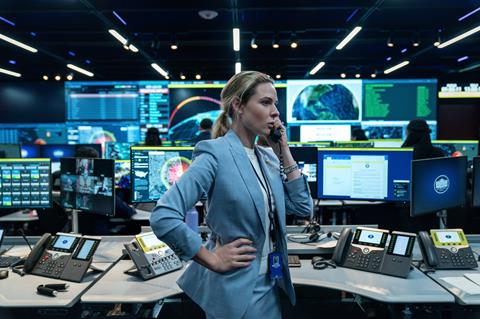Elba leads a superb cast including Rebecca Ferguson and Jared Harris in the director’s Venice competition title

Dir. Kathryn Bigelow. US. 2025. 112 mins
The time is right, alas, for a revival of the countdown-to-doomsday drama of what can be called the world’s first nuclear age – something Kathryn Bigelow’s A House of Dynamite makes clear in its opening. The close of the Iron Curtain era, the film’s captions state, seemed to mark the end of the nuclear arms age, but that brief respite is now far behind us. Bigelow’s military nail-biter re-establishes the terms of anxiety and jeopardy with which the world is once again living, suggesting that the stakes – political and technological – are now even higher.
Bigelow’s boldest and most assured film yet
This intricately structured, informationally dense tale at least depicts a White House and Pentagon operated by people who, if inevitably out of their depth, display professionalism and sanity; the US President within this fictional world is played by a genial, commanding Idris Elba. Precision-tooled, ambitious in scale yet bracingly concise, this is Bigelow’s boldest and most assured film yet. Premiering in Venice Competition before heading to New York and Busan, it’s certain to attract rapt, if somewhat traumatised, attention on its October theatrical release before streaming on Netflix – with serious awards-season attention likely to follow.
Packed with technical terms and acronyms, and teeming with succinctly- but effectively-sketched dramatis personae, the film begins perplexingly, but quickly draws us into a complex world built from interlocking episodes in diverse locations – from a US missile base in Alaska to assorted Washington DC venues and even the symbolically-laden battlefield of Gettysburg.
The essential dramatic core, however, is simple: US monitoring reveals that an intercontinental ballistic missile has been launched by an unknown party from somewhere in the Pacific. Initially, White House experts discount this as likely to have no serious consequences, while weighing up the possibilities of it originating in Russia, China or North Korea. But, after two US interceptor missiles fail to function, it becomes clear that the mystery missile is on a direct trajectory for the US.
The dramatic efficiency of the film, scripted by Noah Oppenheim (Jackie, TV series Zero Day), lies not only in the research that clearly underlies it, but also in the construction. At just a third of the way through the picture the countdown is about to hit zero – at which point, the story returns to the beginning, as new characters are introduced. Later, the same thing happens with another loop back to the start. Ensuring continuity and a sense of the whole, incidents and lines of dialogue repeat throughout in different contexts, the drama underwritten by Rashomon-style shifts of perspective.
Brisk editing pinballs between brief scenes and introduces a plethora of characters effectively defined by their professional functions – although brief glimpses of their private lives flesh out the humanity in a way that feels organic rather than contrivedly gratuitous. The cast includes Rebecca Ferguson and Jason Clarke as senior officials in the White House Situation Room; an imposing, testy Tracy Letts as the STRATCOM (Strategic Command) supremo; Greta Lee as a consultant in North Korean affairs; and Gabriel Basso as a harassed security advisor, anxious to offer a more cautious set of options to prevent catastrophe.
The other key figures are the defence secretary, played by Jared Harris, and the film’s strategically-utilised dramatic ace – Elba’s POTUS. In a canny dramatic ploy, Harris only appears intermittently on a screen before fully emerging as a character, while POTUS is mysteriously unseen before coming to the fore in an extended episode that follows his working day. This starts with an affable, people-friendly appearance at a schoolkids’ basketball event (real-life player Angel Reese appearing as herself), before reaching his moment of truth – the need to make a quickfire and inevitably world-changing decision. The fact that he is, by the nature of his job, desperately unqualified to make that call carries the film’s most alarming real-life resonances.
Production designer Jeremy Hindle, who worked on Bigelow’s Zero Dark Thirty and Detroit (other recent credits includeTop Gun: Maverick) does a mightily impressive job, creating a huge range of settings very convincingly (some, like the Oval Office, presenting the challenge of audience familiarity). DoP Barry Ackroyd, another Bigelow collaborator, uses his roaming camera to bring these spaces alive and focus our navigation from character to character, crisis point to crisis point. This is a film that demands the viewer’s focused attention, and pays off amply in terms of narrative satisfaction and current affairs insight. Just don’t expect too much reassurance from it.
Production companies: First Light Pictures, Kingsgate Films, Prologue Entertainment
Worldwide distribution: Netflix
Producers: Greg Shapiro, Kathryn Bigelow, Noah Oppenheim
Screenplay: Noah Oppenheim
Cinematography: Barry Ackroyd
Editor: Kirk Baxter
Production design: Jeremy Hindle
Music: Volker Bertelmann
Main cast: Idris Elba, Rebecca Ferguson, Gabriel Basso, Jared Harris, Tracy Letts























